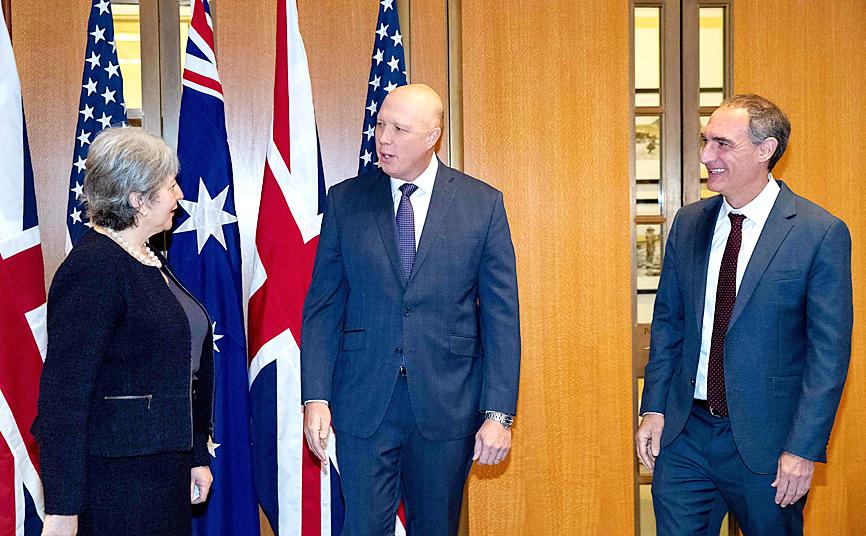Australia yesterday formally embarked on a hotly contested program to equip its navy with nuclear-powered submarines in a new defense alliance with the UK and the US.
Australian Minister of Defense Peter Dutton joined US and British diplomats in signing an agreement allowing the exchange of sensitive “naval nuclear propulsion information” between their nations.
It is the first agreement on the technology to be publicly signed since the three nations in September announced the formation of a defense alliance, AUKUS, to confront strategic tensions in the Pacific where US-China rivalry is growing.

Photo: AFP / Australian Defence Force
The deal would help Australia to complete an 18-month study on procurement of the submarines, Dutton said after signing it in Canberra with US Ambassador to Australia Michael Goldman and British High Commissioner to Australia Victoria Treadell.
Details of the procurement have yet to be decided, including whether Australia would opt for a vessel based on US or British nuclear-powered attack submarines.
“With access to the information this agreement delivers, coupled with the decades of naval nuclear-powered experience our UK and US partners have, Australia will also be positioned to be responsible and reliable stewards of this technology,” Dutton said in a statement.
Under the AUKUS deal, Australia is to obtain eight state-of-the-art, nuclear-powered, but conventionally armed submarines capable of stealthy, long-range missions.
The UK has invited Southeast Asian nations to attend a G7 foreign ministers’ meeting in Liverpool, England, next month, in a move that risks highlighting concerns that AUKUS could fuel a regional nuclear arms race.
ASEAN member states are divided on AUKUS, but some, notably Indonesia and Malaysia, have sharply criticized it, and many in the 10-member bloc are reluctant to take sides in the unfolding rivalry between the US and China.
As many as 21 foreign ministers could attend, as Australia, India, South Africa and South Korea have also been invited.
“I want us to build a worldwide network of liberty that advances freedom, democracy and enterprise, and encourages like-minded countries to work together from a position of strength,” British Secretary of State for Foreign, Commonwealth and Development Affairs Liz Truss said.
Beijing is likely to view this expansion of the G7, which represents the world’s most advanced economic powers, as an attempt to get the region to endorse AUKUS, and a more hard-edged military approach to China.
Beijing has described AUKUS as an “extremely irresponsible” threat to stability in the region.
Meanwhile, naval forces from Australia, Canada, Germany, Japan and the US on Sunday teamed up to conduct the ANNUALEX military exercises in the Philippine Sea, which end on Tuesday next week.
The navies are to practice “enhanced maritime communication tactics, anti-submarine warfare operations, air warfare operations, replenishments-at-sea, cross-deck flight operations and maritime interdiction maneuvers,” the US Pacific Fleet said on its Web site.
Additional reporting by the Guardian and staff writer

Conflict with Taiwan could leave China with “massive economic disruption, catastrophic military losses, significant social unrest, and devastating sanctions,” a US think tank said in a report released on Monday. The German Marshall Fund released a report titled If China Attacks Taiwan: The Consequences for China of “Minor Conflict” and “Major War” Scenarios. The report details the “massive” economic, military, social and international costs to China in the event of a minor conflict or major war with Taiwan, estimating that the Chinese People’s Liberation Army (PLA) could sustain losses of more than half of its active-duty ground forces, including 100,000 troops. Understanding Chinese

The Ministry of Foreign Affairs (MOFA) yesterday said it is closely monitoring developments in Venezuela, and would continue to cooperate with democratic allies and work together for regional and global security, stability, and prosperity. The remarks came after the US on Saturday launched a series of airstrikes in Venezuela and kidnapped Venezuelan President Nicolas Maduro, who was later flown to New York along with his wife. The pair face US charges related to drug trafficking and alleged cooperation with gangs designated as terrorist organizations. Maduro has denied the allegations. The ministry said that it is closely monitoring the political and economic situation

UNRELENTING: China attempted cyberattacks on Taiwan’s critical infrastructure 2.63 million times per day last year, up from 1.23 million in 2023, the NSB said China’s cyberarmy has long engaged in cyberattacks against Taiwan’s critical infrastructure, employing diverse and evolving tactics, the National Security Bureau (NSB) said yesterday, adding that cyberattacks on critical energy infrastructure last year increased 10-fold compared with the previous year. The NSB yesterday released a report titled Analysis on China’s Cyber Threats to Taiwan’s Critical Infrastructure in 2025, outlining the number of cyberattacks, major tactics and hacker groups. Taiwan’s national intelligence community identified a large number of cybersecurity incidents last year, the bureau said in a statement. China’s cyberarmy last year launched an average of 2.63 million intrusion attempts per day targeting Taiwan’s critical

‘SLICING METHOD’: In the event of a blockade, the China Coast Guard would intercept Taiwanese ships while its navy would seek to deter foreign intervention China’s military drills around Taiwan this week signaled potential strategies to cut the nation off from energy supplies and foreign military assistance, a US think tank report said. The Chinese People’s Liberation Army (PLA) conducted what it called “Justice Mission 2025” exercises from Monday to Tuesday in five maritime zones and airspace around Taiwan, calling them a warning to “Taiwanese independence” forces. In a report released on Wednesday, the Institute for the Study of War said the exercises effectively simulated blocking shipping routes to major port cities, including Kaohsiung, Keelung and Hualien. Taiwan would be highly vulnerable under such a blockade, because it